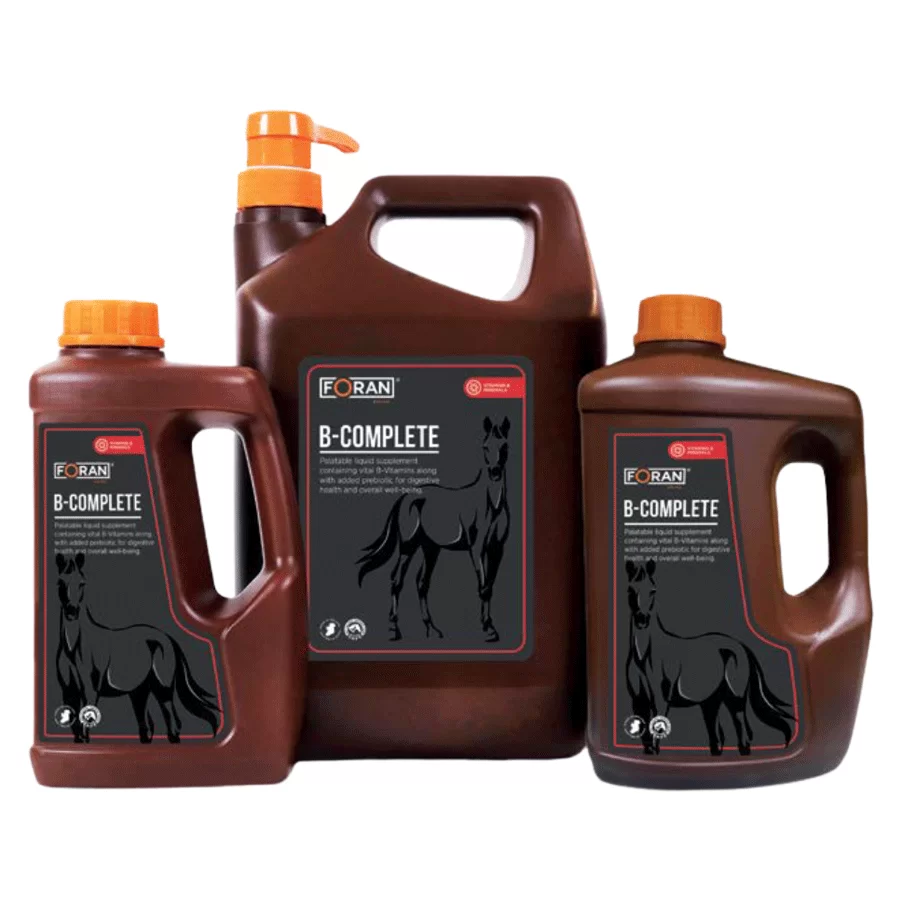B-Complete
B Vitamins with added prebiotic to support digestive health and appetite
View ProductVitamins are crucial for health and body function in the equine diet, with roles in performance, growth, reproduction, energy maintenance and immune system function. B vitamins are a group of water-soluble vitamins that each have unique chemical names and functions, collectively known as the B vitamin complex (this article will refer to the B vitamin complex as B vitamins). The B vitamins have important roles in cell metabolism, processing protein, carbohydrates and fats as well as nerve transmission, energy metabolism and red blood cell production.

Eight of the B vitamins are considered essential, which is why it can seem some are missing from the numerical list of B vitamins on a horse feed or supplement. B vitamins commonly supplemented in the equine diet are:
B Vitamin Sources
As they are water-soluble, B vitamins are not stored by the body and any excess supply is excreted in the urine. All B vitamins are essential to horses and are therefore needed in the diet on a regular basis. B vitamins are plentiful in grass and some cereal grains. Microorganisms, primarily in the hind gut, synthesise B vitamins which are absorbed through the intestinal wall.
Healthy adult horses can usually produce adequate levels of B vitamins – deficiency has not been described in horses except under experimental feed deprivation studies. However, there is a difference between the minimum requirements to prevent deficiency symptoms versus optimum requirements for maximum performance
Many factors can influence the availability of B vitamins; they are produced by the microflora of the hindgut and therefore if the microbial population is compromised as it often is with performance horses, vitamin B availability can be reduced.
B Vitamin supplementation may be beneficial in situations such as:
B Vitamin Supplementation
As key nutrients regulating energy release, B vitamins can impact a horse’s energy levels and performance. They have also been shown to impact appetite and nervous behaviour, qualities which are important to high performance equine athletes. Supplementing B vitamins via the diet can be very effective, they are readily absorbed and utilised when needed and as water soluble vitamins they are very safe and not at risk of over-supplementation.
At Foran Equine we produce a number of supplements containing B vitamins aimed at helping particular scenarios that arise, some of those products include:
B-Complete
B-Complete contains all vital B vitamins essential for blood cell formation and optimal metabolism, maximising the diet for energy production. It is suitable for any horse with a requirement for maximum energy production and can also safely promote appetite during times of decreased stress and fatigue, for example when travelling. The palatable liquid formula supports digestive function and safely promotes appetite.

References
Manthe, B. N. and Youngs, C. R. (2013) An Overview of Vitamin Requirements of the Domestic Horse. Natural Sciences Education, 42(1), 179-184. DOI: 10.4195/nse.2012.00002

